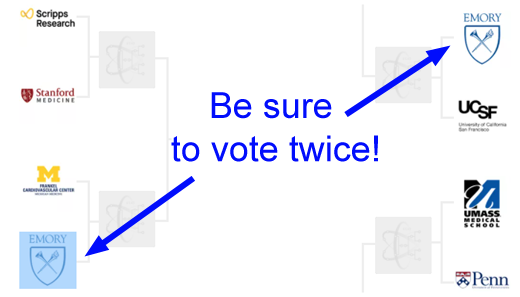Emory is participating in STAT Madness, a “March Madness”-style bracket competition featuring biomedical research instead of basketball teams. Universities or research institutes nominate their champions, research papers that were published the previous year. It's like "Battle of the Bands." Whoever gets the loudest cheers — or most numerous clicks — wins.
The competition starts March 1. The first round ends on the night of Sunday, March 7. We encourage you to visit the STAT Madness page and pleasevote for Emory here:
statnews.com/feature/stat-madness/bracket/
Not everyone votes on all parts of the bracket, so your vote can make a difference. In other words, you don’t have to fill out a whole bracket — you can just vote for Emory.
According to STAT’s engagement editor, it is possible for an individual to vote more than once per device in a given round, but you have to wait a few hours between votes. Still, the way to win is to get friends involved. Please share on social media using the hashtag #STATmadness.
What is different this time around is that Emory has TWO papers in the 64-slot bracket, reflecting our strengths in infectious disease and immunology research. Both of our papers cover COVID-19, but both of our initial competitors’ papers do too. In the first round, Emory is in Matchup 2 (the upper left on the bracket) and Matchup 30 (the lower right). When you vote, be sure to scroll down to Emory’s second paper!
Our team’s paper on autoimmune-like inflammation in severe COVID-19 is matched up with one from the University of Michigan on a related topic. Similarly, our paper on the initial clinical use of baricitinib, previously developed for rheumatoid arthritis, is paired with another report on drug repurposing for COVID-19 from University of California, San Francisco.
More about Emory's papers:
Extrafollicular B cell responses correlate with neutralizing antibodies and morbidity in COVID-19
Matthew C. Woodruff et al., Nature Immunology (2020)
A team led by Emory immunologists Ignacio Sanz and F. Eun-Hyung Lee found that immune cell activation patterns in hospitalized COVID-19 patients resemble those seen in people with lupus. The results were highlighted at a December 2020 NIAID conference on post-acute sequelae of COVID-19.
In lupus, the immune system goes off the rails and produces antibodies against components of our own cells. In COVID-19, an autoimmune response could explain poor outcomes and might be connected with some of the symptoms of "long-haulers."
The Emory team’s report was one of the first pointing to autoimmune-like responses in COVID-19, and since then other respected immunologists have published similar findings. A follow-up study has confirmed the presence of autoantibodies during acute infection, although their persistence over time needs to be examined in larger numbers of patients.
Sanz is a Georgia Research Alliance Eminent Scholar and was the recipient of the 2019 Lupus Insight Award from the Lupus Research Alliance.
Use of Baricitinib in Patients With Moderate to Severe Coronavirus Disease 2019
Boghuma K. Titanji et al., Clinical Infectious Diseases (2020)
Many investigators have tried to repurpose drugs for COVID-19; this is an example of an effort that had some impact. A team led by clinician Vincent Marconi and drug discovery veteran Ray Schinazi tested the efficacy of the drug baricitinib to speed recovery of hospitalized COVID-19 patients. Baricitinib was previously developed to treat rheumatoid arthritis.
This small study (15 patients) supported baricitinib’s inclusion in a larger multicenter NIH-funded clinical trial, which showed that the drug reduced recovery time when combined with the antiviral remdesivir. The FDA issued an Emergency Use Authorization for that combination in November 2020.
This line of research grew out of extensive work by Marconi, Schinazi and colleagues on baricitinib and related drugs’ potential for the treatment of HIV/AIDS. More about this story is available here (includes video).

